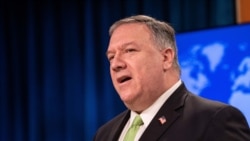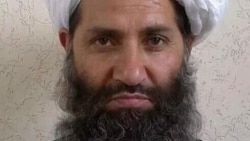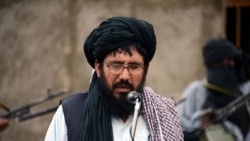A new breakaway Afghan Taliban faction that has close ties to neighboring Iran and opposes efforts aimed at ending the 18-year insurgency in Afghanistan has emerged.
The Hezb-e Walayat-e Islami, or Party of Islamic Guardianship, is believed to have split from the mainstream Taliban soon after the United States and the militant group signed a landmark peace agreement in February.
The formation of the splinter group underlines the possible divisions within the Taliban, which has seen bitter leadership transitions and growing internal dissent in recent years.
It is unclear whether the new splinter group will rally broad support, but its emergence could pose a new hurdle for the U.S.-Taliban deal, which has been undermined by violence, disputes, and delays.
Under that agreement, international forces will withdraw from Afghanistan by May 2021 in exchange for counterterrorism guarantees from the Taliban, which pledged to negotiate a permanent cease-fire and power-sharing deal with the Afghan government.
'Early Stages Of Forming'
Antonio Giustozzi, a Taliban expert with the Royal United Services Institute in London, said it appears the new splinter group is based in Iran, which shares a 900-kilometer border with Afghanistan and has a sizable Afghan population.
"It's still in the early stages of forming," said Giustozzi, adding that the military strength and the leadership of the faction is unknown.
An Afghan intelligence official, who spoke on condition of anonymity, told RFE/RL that the new splinter group has not been "officially announced." The official said members of the group included radical Taliban commanders and members of small Taliban offshoots.
A new report by a United Nations monitoring team made public on June 1 said that "at least one group of senior Taliban" had "formed a new group in opposition to any possible peace agreement."
The breakaway faction was "composed mainly of dissident senior Taliban members residing outside Afghanistan," said the report, which was based on information provided by Afghan and foreign intelligence and security services, think tanks, experts, and interlocutors.
Iran Building Taliban 'Combat Capabilities'
The Hezb-e Walayat-e Islami joins a growing list of Taliban factions that support continued fighting against Afghan and international troops.
"There are several Taliban leaders, fronts, and commanders who oppose peace and are linked to Iran," said Giustozzi.
Among them, he added, is Sirajuddin Haqqani, the deputy leader of the Taliban and the head of the Haqqani network, a powerful Taliban faction that is a U.S.-designated terrorist organization.
That is despite Haqqani's op-ed in February in The New York Times, in which he voiced support for the peace deal with the United States.
Haqqani, who is the Taliban's operational chief, has a $10 million U.S. bounty on his head. He is the son of the late radical Islamist leader Jalaluddin Haqqani, the founder of the Al-Qaeda-linked network blamed for some of Afghanistan's deadliest suicide attacks.
The Haqqani network has strong ties to Pakistan and Saudi Arabia. But Giustozzi said the network is "getting closer" to Iran as Islamabad and Riyadh cut funding to it.
Other Iran-linked Taliban leaders who oppose peace efforts include Mullah Qayum Zakir, a powerful battlefield commander and the former military chief of the Taliban until 2014. A former inmate in the infamous U.S. prison at Cuba's Guantanamo Bay, Mullah Zakir has the backing of hard-line field commanders.
Mullah Zakir leads a conservative Taliban faction along with Ibrahim Sadr, the Taliban's former military commission chief. In October 2018, Sadr was among eight Taliban members designated global terrorists by the U.S. Treasury Department.
"Iranian officials agreed to provide Ibrahim with monetary support and individualized training in order to prevent a possible tracing back to Iran," the Treasury Department said, adding that "Iranian trainers would help build Taliban tactical and combat capabilities."
An Afghan intelligence official, who spoke on condition of anonymity, said the new splinter group included the followers of Sadr.
The officials said the new group also includes members of the Feday-e Mahaz (Suicide Brigade) a small, hard-core offshoot of the mainstream Taliban.
The group is believed to be led by Haji Najibullah, a loyalist to radical Taliban commander Mullah Dadullah, who was killed in a U.S.-led attack in Helmand Province in 2007.
The group, vehemently against reconciliation with Kabul, has claimed several high-profile assassinations over the years.
'Material Support'
Iran backed the anti-Taliban Northern Alliance before the U.S.-led invasion in 2001, when the Taliban controlled most of Afghanistan. Tehran also provided help to U.S. forces as they toppled the Taliban regime. But in recent years the Islamic republic and the Taliban have forged closer ties, with militant leaders even visiting Tehran.
The relationship between Shi'ite-majority Iran and the Taliban, a fundamentalist Sunni group, is complex. Iran officially opposes the Taliban, but experts say it provides some military support to the mainstream Taliban and rival breakaway factions.
Experts say Tehran is hedging its bets and preparing for different scenarios following a U.S. military pullout from Afghanistan, including a possible Taliban takeover of the country.
Tehran has confirmed it has contacts with the Taliban but insists that it is aimed at ensuring the safety of Iranian citizens in Afghanistan and encouraging the Taliban to join peace talks.
But U.S. officials have accused Tehran of providing material support to the Taliban, an allegation it denies.
U.S. Secretary of State Mike Pompeo in January accused Tehran of "actively working" to undermine the peace process in Afghanistan, adding that Iran was supporting the Taliban and the Haqqani network.
In a report released in November, the U.S. Defense Intelligence Agency (DIA) said Iran provides financial, political, training, and material support to the Taliban.
"Tehran does not seek to return the Taliban to power but aims to maintain influence with the group as a hedge in the event that the Taliban gains a role in a future Afghan government," the report said, adding that Iran's support enabled it to advance its interests in Afghanistan and attain "strategic depth" in the country.
Taliban Divided Over Peace
The emergence of the Taliban splinter group has exposed divisions within the militant group.
The Taliban is believed to be divided over a peace settlement.
Its political leadership based in Pakistan is believed to be more open to a peace deal, but hard-line military commanders on the battlefield in Afghanistan demand the restoration of the Taliban regime that ruled from 1996 to 2001.
Internal Taliban divisions have intensified after the death of founder and spiritual leader Mullah Mohammad Omar, whose death was revealed in 2015, more than two years after he had died in Pakistan.
Some Taliban commanders accused his successor, Mullah Akhtar Mohammad Mansur, of covering up Mullah Omar's death and assuming leadership of the extremist group without proper approval.
Mullah Mansur struggled to quell the internal dissent and reconcile feuding factions, with some commanders splitting from the group and challenging his leadership.
Mullah Mansur was killed in a U.S. drone strike in Pakistan in May 2016.
The succession of Mullah Haibatullah Akhundzada, a low-key Islamic scholar who was Mullah Mansur's deputy, was also opposed.
But experts said the Taliban has overcome the succession crises, has fended off competition from the global appeal of the Islamic State (IS) extremist group, and has remained a relatively coherent fighting force despite a deadly war against foreign and Afghan forces.
Borhan Osman, an independent analyst and a leading expert on Islamic extremism and the militant networks operating in the Afghanistan-Pakistan region, said divisions within the Taliban are not yet visible.
"So far, the Taliban has been successful in spinning the agreement with the United States as an outright victory," he said.
Osman said the Taliban's unity will be tested during intra-Afghan talks, when Afghan and Taliban negotiators will discuss a permanent cease-fire and a power-sharing deal.
The negotiations were scheduled to start in March but were delayed by disputes over the release of Taliban prisoners by the government and escalating militant attacks.
"The Taliban will be forced to come up with specific positions on issues and present their vision for a future Afghanistan," said Osman.
The Taliban has been ambiguous on key issues, including women's rights, the future distribution of power, and changes to the Afghan Constitution, reflecting the divisions within the group.
Many expect intra-Afghan negotiations to be complex and protracted, considering the gulf between the sides on policy and the sharing of power between the Taliban and the Afghan government.
Taliban Offshoots
Internal rifts and rivalries have led to the emergence of various Taliban offshoots over the years, although many lack the military strength and support to pose a threat to the mainstream group.
The High Council of the Islamic Emirate of Afghanistan -- led by Mullah Mohammad Rasul -- has been engaged in deadly clashes with fighters from the mainstream Taliban in southern and western Afghanistan since 2015, leaving scores dead on both sides.
The clashes have left the offshoot severely weakened, experts said, with many considering the group to be militarily irrelevant.
Mullah Rasul is believed to receive arms and support from Afghan intelligence in an attempt to divide the militant group.



















